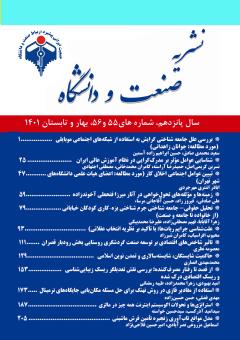تبیین عوامل اجتماعی اخلاق کار (مورد مطالعه: اعضای هیات علمی دانشگاههای شهر تهران)
محورهای موضوعی : Special
1 - استادیار گروه علم و فناوری، پژوهشگاه مطالعات فرهنگی، اجتماعی و تمدنی، تهران، ایران
کلید واژه: اخلاق کار, سرمایه اجتماعی, آنومی اجتماعی, دانشگاه, عضو هیات علمی,
چکیده مقاله :
دانشگاه مهمترین رکن توسعه جامعه محسوب شده و گسترش اخلاق کار و نهادینهسازی آن، بسترهای شکوفایی علمی و صنعتی را در آن فراهم میسازد. هدف اصلی این مقاله تبیین عوامل اجتماعی مرتبط با اخلاق کار است. روش تحقیق از نوع پیمایش (کمی) و ابزار آن پرسشنامه (که روایی و پایایی قابل قبولی داشته) بوده است. با توجه به نامشخص بودن تعداد دقیق اعضای هیات علمی دانشگاههای شهر تهران (جامعه آماری) تعداد 300 نفر بهعنوان نمونه و به روش تصادفی، انتخاب و پرسشنامهها میان آنها توزیعشده و نهایتا تعداد 292 فرم تکمیل، و وارد تحلیل شدند. یافتهها نتایج نشان میدهد گرایش به اخلاق کار دانشگاهی در میان گروه متأهل، اعضای هیئتعلمی جوانتر و در میان رشته ها به ترتیب علوم اجتماعی، علوم تربیتی، کشاورزی (خاصه رشته ترویج و آموزش کشاورزی) و نهایتا علوم پایه بیشتر از سایرین است. نتایج آزمون های آماری نیز نشان میدهد که بین انسجام اجتماعی، اعتماد اجتماعی، مشارکت اجتماعی و تعلق مذهبی رابطه مستقیم و میان سن، آنومی اجتماعی، احساس محرومیت نسبی و احساس تبعیض اجتماعی با اخلاق کار رابطه غیر مستقیم معنیداری وجود دارد و در مدل رگرسیونی نیز این عوامل توانسته¬اند 0.43 درصد تغییرات متغیر وابسته (تعهد به اخلاق کاری) را تبیین کنند.
The university is considered the most important pillar of society's development, and the expansion of work ethics and its institutionalization provide the foundations for scientific and industrial prosperity in it. The main purpose of this article is to explain social factors related to work ethics. The research method was a survey (quantitative) and the tool was a questionnaire (which had acceptable validity and reliability). Due to the uncertainty of the exact number of faculty members of Tehran universities (statistical society), 300 people were randomly selected and questionnaires were distributed among them, and finally 292 forms were completed and entered into the analysis. Findings The results show that the tendency towards academic work ethics is higher among the married group, younger faculty members, and among the disciplines, respectively, social sciences, educational sciences, agriculture (especially the field of agricultural promotion and education) and finally, basic sciences. The results of the statistical tests also show that there is a direct relationship between social cohesion, social trust, social participation and religious affiliation, and between age, social anomie, feeling of relative deprivation and feeling of social discrimination with work ethic, and in the regression model, this is also a significant indirect relationship. The factors have been able to explain 0.43 percent of changes in the dependent variable (commitment to work ethics)
